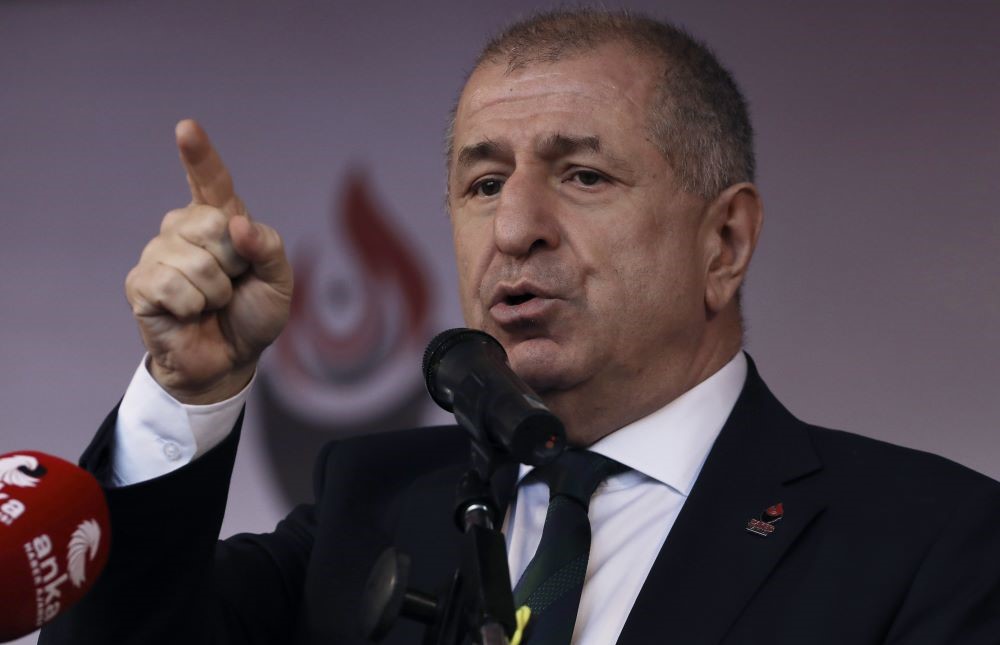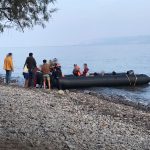ANKARA: A toxic and dangerous anti-refugee discourse is gaining momentum in Turkey. Umit Ozdag, the leader of the nationalist Zafer (Victory) Party, was recently stopped from entering the southern border town of Hatay after he pledged to place a “symbolic” mine at the border with Syria to prevent crossings.
Turkish police, the gendarmerie and officials from the Hatay governorate prevented Ozdag from entering the city, as his move could provoke hatred and incitement against the refugee population in the city. Hatay is home to some 400,000 Syrians.
Experts have warned about far-right politicians using Syrian refugees as a political card ahead of general and presidential elections scheduled for next year.
Ozdag’s party is mainly based on anti-Syrian ideology, pursuing a campaign against the presence of refugees in Turkey and accusing them of causing the country’s dire economic and financial problems.
The Zafer Party, having an insignificant share of votes according to the polls, also criticizes the high birth rates among the refugees, which it terms a “silent invasion” of Turkey.
Ozdag has tweeted controversial videos, claiming he would expel all refugees from Turkey once he comes to power.
He also said that his party would quit the international treaty banning anti-personnel mines and would replant them on the borders to stop refugees.
Ozdag added that every Turkish citizen who wants the Syrian refugees to stay in Turkey is a “traitor.”
According to Friedrich Puttmann, a researcher at the Istanbul Policy Center, Ozdag’s latest statements appear to be inspired by far-right nationalists in the EU, such as the German party Alternative für Deutschland, which also suggested in the heat of Germany’s refugee debate in 2016 that its borders should be defended with military means against the arrival of asylum seekers.
“Ozdag can be considered a political entrepreneur, trying to gain power by basing his party 100 percent on a single new issue in Turkish politics, and doing everything he can to make this issue as big as possible to generate votes from it,” he told Arab News.
Puttmann said that by deploying this strategy, Ozdag is seeking to exploit not only Turks’ grievances with regard to the hosting Syrian refugees but also their strong sense of nationalism.
“To counter this, his critics should therefore not fall into his trap by defending the refugees themselves but rather challenge him on the grounds of what it means to be Turkish,” he said.
Syrian refugees in Turkey have been banned from visiting their families back home during Eid Al-Adha, while new quotas have been applied to residence permits. As of July 1, Turkey will limit permits for foreigners to a ceiling of 20 percent of the population of some neighborhoods.
Puttmann noted that much of the Turkish debate on the Syrian refugees is an extension of the debate on the meaning of Turkish identity.
“If Ozdag’s critics can present a vision of Turkishness that is not divisive but speaks to values shared across different segments of Turkish society, they can also convince the public that planting mines on the Turkish-Syrian border would be the most ‘un-Turkish’ thing to do,” he said.
Turkey currently hosts about 3.7 million Syrian refugees within its borders, apart from more than 200,000 Syrians who were granted Turkish citizenship in a decade. Turkey also provides security and humanitarian assistance to over 3 million Syrians in Turkey-controlled regions in Syria.
According to the latest surveys, anti-refugee sentiment is gaining popularity in Turkey.
A recent survey by the İstanbul Ekonomi Arastirma (Istanbul Economics Research) organization revealed that 61 percent of respondents favored a harsher stance against refugees. The repatriation of Syrians is believed to be among the top topics of the impending election commitments of the opposition parties.
Prof. Murat Erdogan, director at Ankara University’s Migration Research Center and a CATS-SWP Fellow in Berlin, told Arab News that the anti-refugee discourse cannot be resolved by stopping someone from entering a city where the refugee population has reached more than 20 percent of the local population.
“Ozdag and his party are bringing up the existing concerns and anger that are deeply rooted in Turkish society following a large influx of refugees in a short period of time,” he said.
According to the academic, who predicts the development of new political formations, the high levels of attention directed to anti-refugee perspectives has caused the Syrian issue to become associated with discussion surrounding Turkey’s national security.
“The indefinite nature of the immigration process creates a sense of insecurity and fuels concerns in Turkish society that the domestic borders cannot be protected and the immigration wave cannot be managed,” he said.
“While the government frames the refugees as the elements of religious or cultural solidarity as part of its humanitarian foreign policy, the opposition criticizes this policy by securitizing this issue. This is a reality and has been used by populist politicians in recent years,” Prof. Erdogan added.
“It is very important to boost the resilience of Turkish society in the coming period and to implement cohesion policies for Syrians at the local level to prevent further conflicts,” he said.
Two young Syrians — Sultan Abdul Baset Jabneh and Sharif Khaled Al-Ahmad — were killed in Istanbul in June, while a 70-year-old Syrian woman was hit in the face in the southeastern province of Gaziantep last month, triggering an outcry on social media.
On May 31, an immigrant sexually harassed a 10-year-old Turkish boy in Istanbul’s Esenyurt district hosting a large population of refugees. The immigrant was arrested, but local anger swiftly poured into the streets.
As part of a new project, the Turkish government recently committed to voluntarily relocating 1 million Syrians to northern Syria by establishing necessary infrastructure.
By: Menekşe Tokyay
Source: Arab News
***Show us some LOVE by sharing it!***



